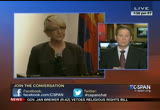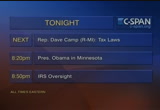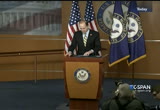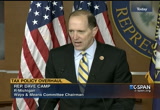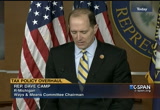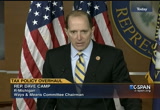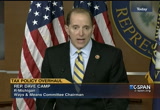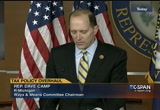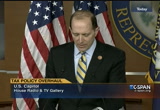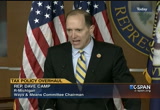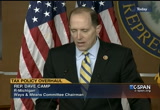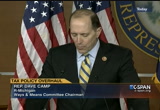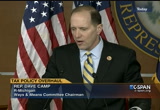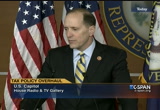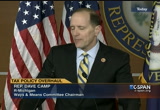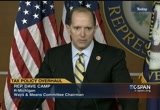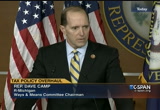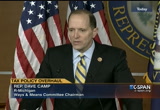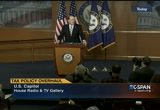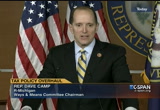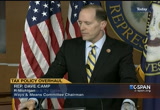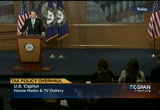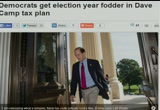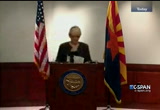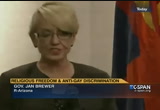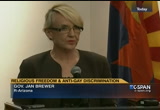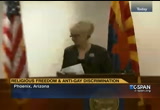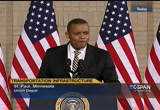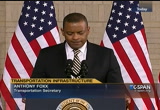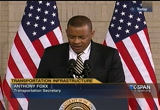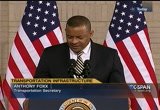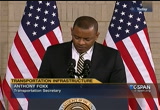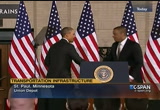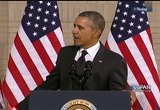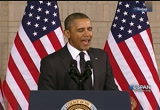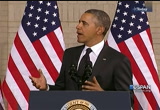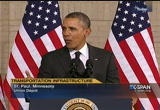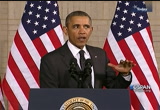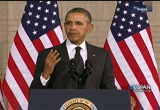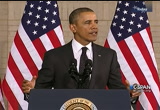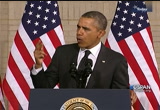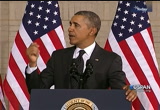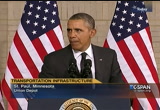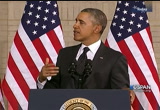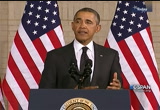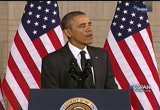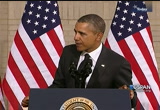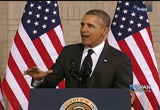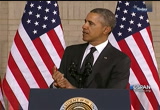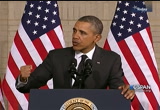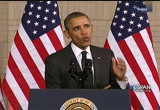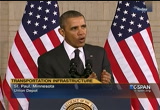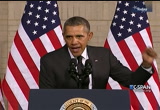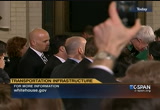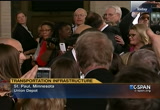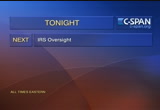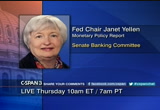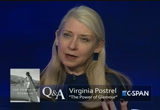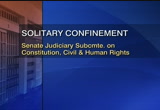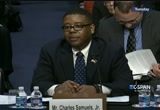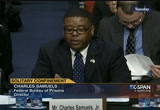tv U.S. House of Representatives CSPAN February 26, 2014 8:00pm-9:01pm EST
8:00 pm
to be nice and to be -- god says plain and simple, this is not acceptable. fine. if you -- you know, if this is something that has to be done, don't force it on me. don't force it on my state, don't force it on my children. just do what you'rejust do whato do. don't say you are being discriminated against because i don't believe that. host: ok, bob. appreciate all your comments. they continue as well tomorrow morning on washington journal at 7:00 eastern. hereore tweak here -- week -- tweet here, this one from mary -- more tomorrow morning here on c-span on washington journal. >> coming up tonight on c-span, house means chairman dave camp introduces his tax reform proposal. obama ist, president
8:01 pm
in minneapolis to discuss transportation infrastructure funding. later, a hearing on new irs rules regarding tax-exempt status for nonprofit organizations. >> house ways and means committee chairman dave camp announced a new tax reform proposal today. chairman cap is calling for ending deductions for state and local taxes. this briefing is when he minutes. >> hello and good afternoon. there have been so many changes to the tax code over the last day,e, more than one every that it is now 10 times the size of the bible with none of the good news. i know that seems like an old joke now. you may have heard it several times. when i travel around michigan or anywhere around the country, it still gets a pretty good laugh. as i listen to hard-working
8:02 pm
taxpayers talk about how we need to simplify and six our broken outdated tax code. what isn't funny is the impact washington's constant tinkering with the tax code has had on our economy and our families. we don't have to look long before we see but the current tax code has done to jobs. wages have been steadily falling over the last five years. this economy cannot even produce enough jobs for all the kids coming out of college today. there are a record number of young americans who are moving back in with their parents instead of launching their own careers and starting their own families. the last time we reformed the tax code was 1986. that was 28 years ago. beacon is nowthe falling behind. it risks falling even further behind unless we take action. the time to act is now. america cannot afford to wait. i really saw up close just what
8:03 pm
a mess washington was making of the tax code back in december of 2010 when a few of us in the administration, the senate and house would huddle on a daily basis to figure out how to handle expiring tax provisions. there was no rhyme or reason and no justification for such short-term policymaking. not when the real world makes business decisions on a long-term basis. after that, i sent the committee to focus on comprehensive tax reform. we held over 30 hearings including the first joint hearings with the senate since world war ii on tax policy. 11 i levin and i formed partisan working groups to tackle different policies. we also launched tax reform.gov which produced more than 14,000 public comments on the need for and suggestions on how to do tax reform. we have done this in the most open, transparent and bipartisan
8:04 pm
basis, getting input from all sides. askedugust, the democrats to see a bill to start analyzing. a lot of republicans have asked to see a bill to start analyzing. we have already lost a decade. he for we lose a generation, we must enact real, meaningful tax reform to get this economy back on track. a simpler releasing -- what a simpler tax code looks like. more importantly, what that could mean for america's families and job creators. my plan is guided by one simple principle. when it comes to the tax code, everyone should play by the same rules. tax rates should be determined by what is fair, not who you know in washington. tax reform act of 2014, is a three-point plan. first, we need to make the tax code simpler and fairer so companies can do their own taxes
8:05 pm
without being audited or worrying about someone else who can afford high-priced talent getting a better deal. we flatten the tax code by reducing rates and collapsing brackets for virtually all taxable income. ensuring that over 90% of taxpayers face maximum rates of 25% or less. the plan also reduces the corporate tax rate to 25%. we make commonsense reforms like increasing the standard induction and the child tax credit. what that means is that 95% of the country no longer has to itemize. they can get the lowest possible tax bill just by filing the basic 1040, nomura itemizing, no more keeping track of all those receipts and filling out extra schedules, forms and worksheets. second, we make the tax code more effective and efficient by
8:06 pm
getting rid of special interest handouts and lower tax rates for individuals, families and businesses. this will allow small and large businesses alike to expand operations, hire new workers, increase benefits and take-home pay. you will hear a lot about one provision or another. fairerwant a simpler, and flatter tax code. when we ask the american people, more than 80% said the complexity of the tax code hurts the economy. by a two to one margin, they support making changes. even some of the most sensitive policies like the home mortgage reduction and charitable contributions. what they really want and what this plan delivers is a stronger economy. they want to feel like they have security in knowing they, their children and their children's children will be able to reach for and achieve the american dream. after streamlining the tax code, the independent analysts say this plan could increase the --e of our economy by 3.4
8:07 pm
$3.4 trillion. economicthe stronger growth, we will see nearly 2 million new jobs created. a $700ill be up to billion in additional federal revenues that can be used to lower taxes even further or reduce the debt. what is the impact of that kind of growth on middle-class families? because we will have a healthier economy, wages will start to go back up. families will have an extra $1300 in their pocket at the end of the year. that comes from a combination of lower taxes and higher wages. the tax code more accountable to hard-working taxpayers. no more hidden provisions that only benefit a favored few. to bailoutncreases washington from its debt and deficit problems. if we are going to close a
8:08 pm
loophole, the american people should get the benefit of a lower rate instead of just handing them money over to washington so he can spend more. we close a lot of loopholes, we got a lot of the junk out of the code. our plan reveals 228 sections of the tax code. we cut the size of the income tax code by roughly 25%. tax reform needs to be about strengthening the economy, making the codes blur and fairer. today we had the opportunity to make the first step forward. this is the kind of tax code the american people need and deserve. before he opened us up to questions, i want to draw your attention to a list of the major provisions in the press release. when you are talking about the entire tax code, there is a lot to go over. i want to highlight a few items on the list in addition to lowering rates, this includes simpler improved taxation of investment income.
8:09 pm
we tax long-term capital gains and dividends as normal income but exempt 40% of such income six tax, resulting in a percentage point decrease from the maximum rate individuals pay today. lowest achieves the level of double taxation on investment income in modern history. we completely repeal the alternative minimum tax both that the individual and corporate levels. this is something that congressman richie neal has made his life's work. benefits, weion adopt recommendations coming from the bipartisan education groups led by congressman diane black to consolidate education tax benefits. along with the additional money from stronger economic growth, ilies can more easily afford the cost of a college education. the more affordable care --
8:10 pm
while the plan generally leaves obamacare policies untouched and for a later debate on health care, there are two main subsections -- exceptions. one, a repeal of the medical device tax. second, a repeal of the medicine cabinet tax which prohibits the use of funds from tax-free accounts to purchase over the counter medicines without obtaining a prescription. infrastructure investment, the plan dedicates $126.5 billion to the highway trust fund. simplification for seniors, the plan adopts a proposal supported by aarp and atr that requires the irs to develop a simple return to the known as form 1040sr for individuals over the age of 65 who received common kinds of retirement income like
8:11 pm
annuity and social security payments. giving, the plan expands opportunities to make tax-deductible contributions past the end of the year. incentives,manent simplifies exempt organization taxes and sets a floor instead of a cap to the amount of donations that can be deducted. the economic growth in this plan will increase charitable giving by $2.2 billion annually. i am sure you have a lot of questions. i am happy to take a few of those now. later, we will post a more detailed background walk-through of the plan for members of the media. that will be a 4:00 p.m. this afternoon. thank you. chairman, yesterday senate minority leader mitch mcconnell said he and his -- he
8:12 pm
saw no chance for passing tax legislation this year. this morning, the speaker wouldn't promise a vote. when asked for details, i believe he said "blah blah blah." do you feel you are being undercut? >> i don't think we can afford to wait. to settle for an economy that grows at 2%. i am not going to settle for high unemployment, kids living at their parents and not getting out on the run. i am not going to settle for declining wages for the middle class. we need to be the party of growth, opportunity, restoring the american dream. haveis something americans hungered for. we have an obligation to debate the big issues of the day. i put out this draft so we can engage the american people on this. i think this is something that as i have traveled the country,
8:13 pm
this is something that people very much want to see move forward. >> mr. chairman, this seems to be one of these intractable things. since 1986 we haven't made major changes. isn't the tax code kind of right where everybody wants it? democrats and republicans want to change tax policy. you want to eliminate loopholes. they have already started to do so in the last 48 hours. sincere have been times 1986 when our economy was strong. that is not the case now. we have an obligation to find ways to get economic growth, hope for families, opportunities for families. for the first time ever, we have a tax bill that will be scored in what we call a dynamic way. that is why i was able to give you those figures in terms of
8:14 pm
20% added to gdp, almost 2 million jobs, higher wages, more charitable giving. these are the kinds of things that i think people want to see. investment in infrastructure. the other point that i have to make is since 1986, other nations have been changing their tax policies. there is a reason some of our american companies have moved to places like ireland. canada has dramatically reformed their tax code. mexico is beginning to do the same thing. if we don't act, we fall further behind the rest of the world. in the 1980's, we had the lowest corporate tax rate in the world. today we have the highest. in order to build this country back -- i want to see a strong america. i want to see us have the strongest growing economy in the world. tax reform is one way to do that. there are other issues that also help move us forward. tax reform is a big one that
8:15 pm
moves us in a positive direction according to the nonpartisan reveries that analyze our tax bills. >> the second part of my is about folks who want to protect things the way it is. you say if we're going to compete with other nations we have to get with it. [indiscernible] >> we need to have this debate. we need to move the country forward. that is why this is a discussion draft. so we can begin to engage the american people and small business owners and families on how best we can move this country forward. >> when you were asked in november by the leadership to come up with a democratic partner to come to this podium with, why did that not happen? you have a partner in the white house who said they favor a corporate tax plan. why don't you take them up on
8:16 pm
that offer and began negotiating? >> one of the reasons -- first of all, there is a corporate plan in this discussion. i think it will help modernize our tax system in a business sense. think that the problem with just to incorporate only is you don't get as much economic impact. first of all, more than half of asinesses are organized individuals. if you do corporate only plans, what happens to those small businesses that file as individuals? i think it is important to move forward on what i would call a comprehensive plan that involves both individuals, small businesses and corporations. not all corporations are large but many of them are. many of them do business internationally.
8:17 pm
that is a different part of the economy. it is important. a lot of these proposals that i have mentioned have both republican and democrat support. i think you will see as we move forward, you will see the fact that there is a strong dynamic score here, a lot of interest in getting this economy back on track. >> is the credit union tax exemption preserved? >> that oppression -- that portion is not going to be addressed in this bill. >> is that one of the loopholes in the code? reformink we do need to the law with regard to carried interest. particularly when the activity is more like wage income. we take a commonsense approach to where the activity is more like wages it will be reported and taxed as income. i think that is an appropriate reform. advertising taxes?
8:18 pm
>> one of the things we are doing in this legislation -- and there is going to be a detailed briefing on this policy -- but i businesses,r all the top rate is going to be 25%. there is a significant rate reduction. one of the things we need to engage people on is the trade-offs we are making in order to lower rates. with regard to advertising, the first $1 million of advertising will be expensed as is now. i think that the 25% rate and the growth that comes from that that ourhange means economy grows by 20%. [indiscernible]
8:19 pm
>> many businesses organized this way because of tax reasons. would prevent them from organizing as a c corporation if they wanted to. important to the revenue-neutral in this bill. we are in a static basis. we are also distribution only neutral. this is about how to move forward with the fairest plan possible. >> the tax on large banks and insurers, can you provide an industry-neutral -- >> as we look at the financial side of this bill, we need to look at the fact that the top rate that corporations will pay is 25%. that is a 30% reduction from the
8:20 pm
rate they pay now. beorder to be able to revenue-neutral, there are going to be certain trade-offs. one of the things we're going to be able to do is have a public discussion about the trade-offs that have been made in this legislation. >> can you list those trade-offs? >> there is going to be a detailed briefing. i think i already answered that question. >> could you talk about the decision to do this 35% bracket? i know you wanted to get the top rate down to 25%. next when you take this to the committee? >> let me answer the second part first. the committee has a bipartisan meeting tomorrow where the joint committee on taxation will walk through the details. the treasury has also agreed to
8:21 pm
send staff to that. we will be coordinating with them. lew hasy lwq has -- agreed to provide support on this. isi said, this plan distribution only neutral. there is not going to be a tax cut at the top and. with the changes surrounding the fiscal cliff, there was a significant change in the baseline at the top end. this bill simply continues that change that was made in the last year. thank you very much. politico writing that dave camp is giving democrats a fat election your gifts. his long-awaited tax reform bill includes something to offend seemingly everyone.
8:22 pm
manufacturers, wall street banks, governors and deficit hawks. the ways and means committee chairman emphasizes what taxpayers will get in return. code that willer give the economy a jolt. the politico story goes on to say it is a high risk gamut that will leave many republicans fighting off complaints this election year that they are targeting scores of popular tax breaks. half-hour ago, and a resume governor john brewer -- jan brewer announced she would repeal a bill passed by legislation last week. here is that briefing. >> good evening and thank you all for joining me here this evening. i am here to announce a decision on senate bill 1062.
8:23 pm
-- greatvery proposal concern and careful evaluation. theml them like i see despite the cheers or boos from the crowd. [no audio] i have asked questions and i have listened. i have protected religious freedoms when there is a specific and pressing concern that exist in our state. i have the record to prove it. my agenda is to sign into legislature -- i made my priorities for this session abundantly clear. among them are passing a responsible budget that continues arizona's economic comeback.
8:24 pm
from ceos to entrepreneurs to business surveys, arizona ranks as one of the best states to grow or start a business. our immediate challenge is fixing a broken child protection system. instead, this is the first policy bill that crossed my desk. senate bill 1062 does not address a specific or pressing concern related to religious liberties in arizona. i have not heard one example in arizona where a business owner's religious liberty has been violated. in bill could result unintended and negative consequences. after weighing the arguments, i have vetoed senate bill 1062 moments ago. supporters, i want you to know that i understand that long-held norms about marriage and family are being challenged
8:25 pm
as never before. our society is undergoing many dramatic changes. however i sincerely believe that senate bill 1062 has the potential to create more problems than it purports to solve. it could divide arizona in ways you cannot even imagine and no one would ever want. religious liberty is a core american and arizona value. so is nondiscrimination. let's turn the ugliness of the debate over senate bill 1062 into a renewed search for greater respect and understanding among all arizonans and americans. >> [indiscernible] traveled to obama minnesota wednesday for a speech on transportation
8:26 pm
infrastructure. the president announced that his budget proposal includes a four-year transportation reauthorization. , this is 20nt paul minutes. u.s. secretaryme of transportation, anthony fox. [applause] >> hello, st. paul. how are you feeling? it is great to be with you this afternoon. it is a privilege to warm the stage up for president barack obama. [applause] this marvelous, beautiful building is one reason why st. paul is so unique.
8:27 pm
[applause] today to celebrate the transportation vision you have as well as the program that helped make it possible. your vision is unique and toether we have helped you realize the vision you have for st. paul and the greater st. paul area. as we travel around our great nation, it is clear that so many communities like st. paul also have a vision. i can also tell you that a big portion of our national to-do list still remains unfunded. five years ago, this depot would have been on your list and would have likely state on that list for years. like thousands of projects
8:28 pm
nationwide, it would have sat there collecting dust and becoming even more expensive every year we waited. this isthe reason for that projects at the local level have traditionally been really hard to secure funding for. at least that is the way it was until five years ago. ago, the president signed the american recovery and reinvestment act. [applause] you heard of it. the first $1.5 billion for a program that would fund the country's worthiest transportation projects and we called it tiger. what it has done is nothing
8:29 pm
short of game changing. tiger has enabled communities to dream again. to help make projects happen. projects that would have been difficult if not impossible otherwise. port neededes, the about a mile of railroad track lay down so they could transport goods faster from ships to the shores. tiger made that happen. near where i am from in north inolina, there was a bridge the eye 85 corridor which carried tremendous amount of freight but it was considered the worst bridge in the entire state. tiger provided funding to help get that bridge repaired. to say nothing of the building that we are gathered in today right now. tiger played a big role in restoring this depot too. [applause]
8:30 pm
for five years, we have seen tiger investments like these translate into more jobs, better economies and a higher quality of life all across america in all 50 states. there will be a sixth round of tiger this year. [applause] i want to give a shout out to members of congress who made it possible like senator patty murray for their bipartisanship and carriage. you should also thank the builders of projects like this one for proving that tiger can work and create jobs. all, most of all, you should put your hands together
8:31 pm
8:32 pm
>> it is good to be back in minnesota. [applause] i love you back. good to see you. say that when we got foxxhe plane, secretary who is from north carolina turned to me and he said, this is the coldest i have ever been in my life. [laughter] we were only out there for like a minute. [laughter] soft yous to show how folks from north carolina are when it comes to weather. [laughter] [applause] i on the other hand, from chicago -- [applause] down the stairs i was
8:33 pm
like, this is balmy, this is great. february in minnesota, can't beat it. in addition to secretary foxx, give him a big round of applause for that introduction. [applause] got to bang champions for the people of minnesota here today. representative that he mccohen andty representative keith ellison. [applause] cohenve your mayor chris in the house. the new mayor of minneapolis is here. [applause] friend who told me i was running for president before i knew i was running for president, love that man. [applause]
8:34 pm
now i want to thank everybody who showed me around union depot and gave me a preview of this new light rail line. it is fantastic. [applause] i also just want to say, even though he is not here today, i want to say to everybody how michelle and i have been keeping in our thoughts and prayers one of the great americans that we know, walter mondale. [applause] now, like millions of americans i was watching the olympics. minnesota sent 19 athletes to the games. [applause]
8:35 pm
tied for second-most most of any state and they did us all proud. it is not shocking that minnesotans might be pretty good at the winter olympics. [laughter] what is interesting is that once route thattiny town it really is hockeytown, usa. tj's shooed outperformance against the russians, i enjoy it a lot. i tweeted about it. we spent some time over the last few weeks on hockey. i am not here to talk about hockey. by the way, i cannot play hockey. i grew up in hawaii. we do not have hockey in hawaii. [laughter] i am here to talk about what you're doing in the twin cities. and how you're helping to create
8:36 pm
new jobs and new opportunities for every american. we are at a moment when our economy is growing. our businesses have created about 8.5 million new jobs in the past four years. unemployment is at the lowest it has been in over five years. in minnesota, it is lower than it has been in 6.5 years. [applause] by the way, you have got a great governor. he is hoping to make that happen. in a lot of ways, things are looking up. trend that hadhe been battering middle-class families for a long time has gotten even starker because those at the top are doing better than ever while wages and income for a lot of families have barely budged. too many families are working harder than ever just to keep up. as i said at the state of the union address, our job is to reverse those trends.
8:37 pm
we have got to build an economy that works for everybody. we have got to restore opportunities for all people so that no matter who you are, where you come from, what you look like -- [applause] you can get ahead if you work hard. agendaout an opportunity that has four parts. number one, good jobs that pay good wages. manufacturing, energy, and infrastructure. over two, train folks with the skills they need to get those jobs. something that your senator is working hard to do everyday. [applause] three, guaranteeing every child has access to a world-class education. [applause] four, making sure that hard work is rewarded with wages youcan live on and savings can retire on and health care
8:38 pm
you can count on. that is what we are fighting for. [applause] minnesota is helping to lead the way on these issues. poisedate legislature is to raise your minimum wage this year. [applause] i called for a new women's economic agenda. it is actually a family economic agenda. equal pay for equal work. leaders in your state legislature are working hard on this because they know when women succeed, america succeeds. [applause] on all these issues, we are reaching out to members of congress, looking to see if they are willing to work with us on some of these priorities. what i also said at the state of the union is, in this year of action, whenever i can partner
8:39 pm
directly with states or cities or business leaders were civic leaders to act on this opportunity agenda, i am going to go ahead and do it. we can't wait. we have got to move. we have got to get things going. too many families are counting on us. [applause] yesterday, i launched new hubs to attract 20th-century manufacturing jobs to america. newy, i am here to launch a competition for 21st-century infrastructure and the jobs that come with it. any opportunity agenda begins with creating more good jobs. one of the fastest and best ways to create good jobs is by rebuilding america's infrastructure. our roads, our bridges, our rails, our airports, our schools, our power grids. we have a lot of work to do out there. we have to put folks to work. [applause]
8:40 pm
one of the most difficult things about the financial crisis was the housing bubble bursting. construction workers were hammered harder than just about anybody. while we have cut the unemployment rate for construction workers almost in half since 2010, too many are still looking for jobs at a time when we have got so much that we could put them to work on rebuilding. got ports that aren't ready for the next generation of supertankers. we have more than 100,000 bridges that are old enough to qualify for medicare. [laughter] everybody knows -- and nobody knows better than minnesota, when we go through a winter like full ofads are racked, potholes all across the country. [applause]
8:41 pm
other countries are not waiting to rebuild their infrastructure. they are trying to help build us today so they can outcompete us tomorrow. gdp,percentage of countries like china and germany are spending about twice what we are spending in order to build infrastructure, because they if they have the fastest trains on the planet or the highest rated airports or the busiest, most efficient ports, that businesses will go there. we don't want businesses to go there. we want them to come here to minnesota. we want them to come to the united states of america. that means the best airports, roads, trains, should be right here in america. [applause] at a time when companies are saying they intend to hire more
8:42 pm
people, we need to make that decision easier for them. we can create jobs at the same time, rebuilding our transportation systems, power grids, communications networks, all the things that commerce relies on. and it helps get workers to those jobs. the bottom line is, there is work to be done, workers ready to do it. rebuilding infrastructure is vital to business. it creates good paying jobs that cannot be outsourced. this is one of congress's major responsibilities, helping states and cities fund new infrastructure projects. [applause] part of the reason i am focused on this is because congress has an important deadline coming up. a congress doesn't finish transportation bill by the end of the summer, we could see construction projects stop in
8:43 pm
their tracks. machine sitting idle, workers off the job. next week i am going to send congress a budget that funds rebuilding our transportation infrastructure in a more responsible way, by doing it over four years which gives cities and states and private investors the certainty they need to plan major projects. projects like repairing essential highways and bridges, building new transit systems in fast-growing cities and communities so folks who live there can get to work and school every day and spend less time sitting in traffic. [applause] and we are going to have to contract smarter transportation systems that can withstand the worst impacts of climate change like bigger surges of water in recent floods. all told, my transportation budget will support millions of jobs nationwide and will pay for
8:44 pm
these investments in part by simplifying the tax code. we are going to close wasteful tax loopholes, lower tax rate for businesses to create jobs here at home, stop rewarding anies for sending jobs to other countries and use the money we save to create good jobs rebuilding america. [applause] it makes sense. there are leaders in both parties who are willing to reach across the aisle in congress when it comes to american infrastructure. they know how important it is. infrastructure didn't used to be a partisan issue. it shouldn't be democrat or republican. everybody uses roads, ports and airports. unfortunately, time and again, there have been some republicans in congress who have refused to act on commonsense proposals that will create jobs and grow
8:45 pm
our economy. -- thatt that they are they don't like roads, they just don't want to pay for them. it doesn't work that way. you have to come up with a way to get these projects going. is deciding what to do next, i am going to go ahead and do what i can to create more good jobs. that is why i came here to st. paul. [applause] this project symbolizes what is possible. andn depot was renovated expanded with the help of what we call tiger grants. --se are embedded of competitive grants that we created part is the recovery act. also known as the stimulus, which actually worked. [applause]
8:46 pm
the idea is if a city or state comes up with a plan to modernize transportation infrastructure, i will have a significant impact on economic activity, and if they line up other sources of funding to pay for it, they can win a tiger grant and the federal government becomes a partner. so far, these grants have given a boost to 270 infrastructure projects across all 50 states. you heard secretary foxx talk about these grants. they're hoping cities like l.a. and states like north carolina. they helped you rebuild this depot into a hub that will bring different modes of transportation together under one roof. amtrak is going to be here. the new metro green line will be here. [applause] i just had a chance to take a
8:47 pm
look at some of those spiffy new trains. they are nice. energy-efficient. they're going to be reliable. you can get from one downtown to the other in a little over 30 minutes instead of, when it is snowing, being in traffic for over two hours. [applause] the trains were made in california which meant folks were put to work here in the united states building them. [applause] here is the best part of it, not only have you made a more efficient transportation system, cutting down commutes, saving on ,as, reducing carbon pollution but this depot has also helped
8:48 pm
boost economic development in st. paul. just across the street, the old downtown post office building is becoming apartments and shops. jobsold, more than 4000 were created from this project. [applause] and we are seeing businesses pop development crop up all along the way. so everybody is winning. because of some flexibility that we showed during the planning process, the line is also going to stop in some poor neighborhoods that often have difficulty getting to the places where there are jobs. [applause] folks whog to help are willing to work hard to get into the middle class, help them get access to opportunities that up until this point, they had a
8:49 pm
tough time. .e know this works today, we are kicking off the next round of competition for tiger grants. mayors and governors, city councils, state legislatures, all of you watching here today, if you have got a great idea for your city or your state then let us know your plan. if it will encourage economic activity and support local businesses and help put people to work, then your country is interested in partnering with you. tiger grants are the only way that we can help cities like st. paul and minneapolis rebuild their infrastructure. you have federal funding to help build the green line. that is going to make it easier than ever to travel between the two cities. you have thousands of construction workers from all over minnesota helping to build it, nearly 200 police officers, maintenance officers being hired. that is not counting all the jobs being graded in the offices an apartment buildings.
8:50 pm
because the train stops at neighborhoods that have access to public transportation, those folks are going to work. all of this can be duplicated all across the country, but unfortunately funding for these projects are going to be in jeopardy unless congress passes this new transportation bill. i want everybody to understand. , keith ellison, betty, they are already on board. [no audio] [applause] some democrats and republicans are already working together to make sure transportation funding doesn't run out. we are seeing some glimmers of hope. this new round of tiger grants was a result of bipartisan cooperation. that is what needs to happen. we're going to need your voices
8:51 pm
telling a story around the country about why this is so important. roads and bridges should not be a partisan issue. more americans should have access to the kind of efficient, affordable transit you're going to have with the green line. [applause] there is no faster way or better way for congress to create jobs right now and grow our economy right now and have a positive impact for decades then if we start more projects and finish more projects like this one. let's create more good jobs, smarter schools, better airports, faster railways, better broadband networks. let's educate our kids and workers better. let's rebuild an economy where everybody has a chance to get ahead. [applause] this is the beginning not the end, we have a lot more rail we have to lay. we have a lot more roads we have to travel. let's get going, minnesota. thank you. god bless you.
8:52 pm
8:54 pm
8:55 pm
dave camp introduces his tax reform proposal. >> on the next "washington l," a gop alternative to the affordable care act. the chairman of the democratic caucus discusses the house democratic agenda. later, nbc news correspondent harry smith talks about his documentary looking at the marijuana industry in colorado. is --ngton journal" live is live every morning at 7:00 eastern on c-span. federal reserve chairman janet yellen testifies before the senate banking committee thursday. her first time since being confirmed to lead the nation's central bank. you can see it live at 10:00 a.m. eastern on c-span 3. you can join the conversation on facebook and twitter.
8:56 pm
>> is this a technique you hope will improve jobs -- [indiscernible] >> i don't think that is any of your business. [laughter] >> i think the glamour of reagan had less to do with his hollywood roots per se. the glamour of hollywood exactly, but it did have something to do with the skill and the grace he acquired as an actor, the fact that he always hit his mark. made beingike -- he out there, fielding those questions look effortless. that is another aspect of glamour. people who were likely to support him politically could see in him, sort of the ideal representation of their views because he didn't make them --
8:57 pm
they weren't waiting for him to fail. as he got older, that became more of an issue. in those early days, he had this kind of -- a word i use in the it comes from a 16th century book of the courtier. >> defining and using glamour, sunday night at 8:00 on c-span's "q&a." >> a senate judiciary subcommittee held a hearing on the use of solitary confinement and prisons. senator al franken questioned the director of the bureau of prisons. you can see this in its entirety at c-span.org. here is a look. cell? big is a how big is the average cell in solitary?
8:58 pm
>> he average size? >> the size of a cell, how big is it? to get this -- it is a human thing we are talking about. >> the average size of a cell is -- you are looking for the space of what these? >> yes, the dimensions in feet. in inches. the size of the cell. that a person is kept in. -- am io get some idea asking this wrong? [laughter] is there -- is what you're saying is that there is no such thing as an average cell for solitary? typically, in the bureau of prisons, someone is in solitary
8:59 pm
confinement, how big is the cell typically? size should be to six by four. >> ok, that is an answer. six by four. cellthe person in the during months and months of this, do they have the ability to talk to family? >> yes. >> they always do? >> it is not on a frequent basis but we provide individuals who are in restrictive housing on average -- they are receiving one phone call per month. this is something that we are looking at when i talk about reform for our disciplinary process. we need to change it.
9:00 pm
that is something that we are willing to continue to look at to ensure that we are providing more access for those phone calls. >> well i have run out of time. we will have some witnesses who may be a little more descriptive. >> it is 10 by seven for the cell size. >> >> thank you. the irs is drafting new rules. irs commissioner discusses the potential rules for 501(c) four nonprofit groups applying for tax exempt status and testimony before a house subcommittee on wednesday. this is two hours.
143 Views
IN COLLECTIONS
CSPAN Television Archive
Television Archive  Television Archive News Search Service
Television Archive News Search Service 
Uploaded by TV Archive on

 Live Music Archive
Live Music Archive Librivox Free Audio
Librivox Free Audio Metropolitan Museum
Metropolitan Museum Cleveland Museum of Art
Cleveland Museum of Art Internet Arcade
Internet Arcade Console Living Room
Console Living Room Books to Borrow
Books to Borrow Open Library
Open Library TV News
TV News Understanding 9/11
Understanding 9/11